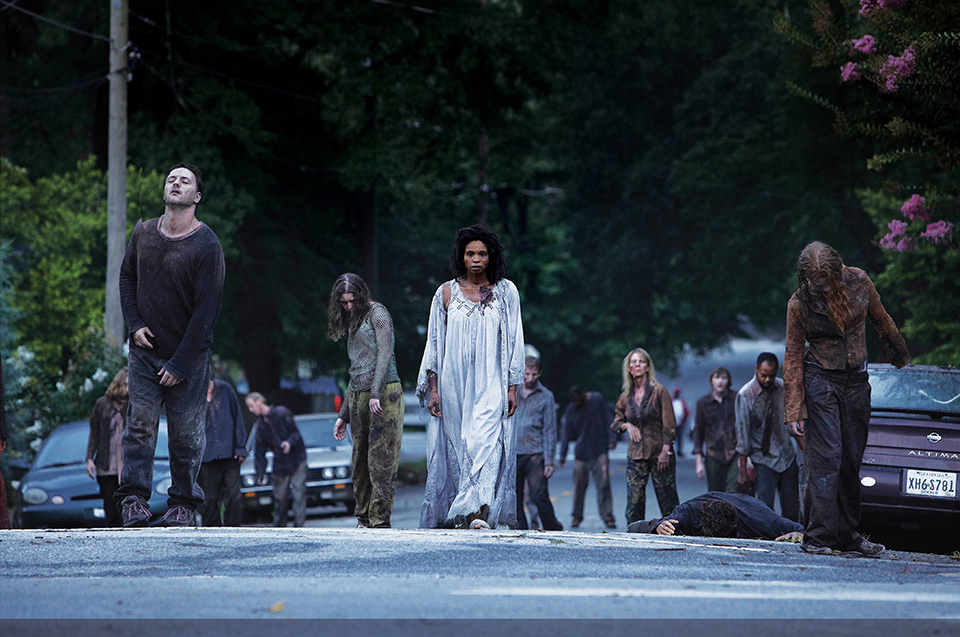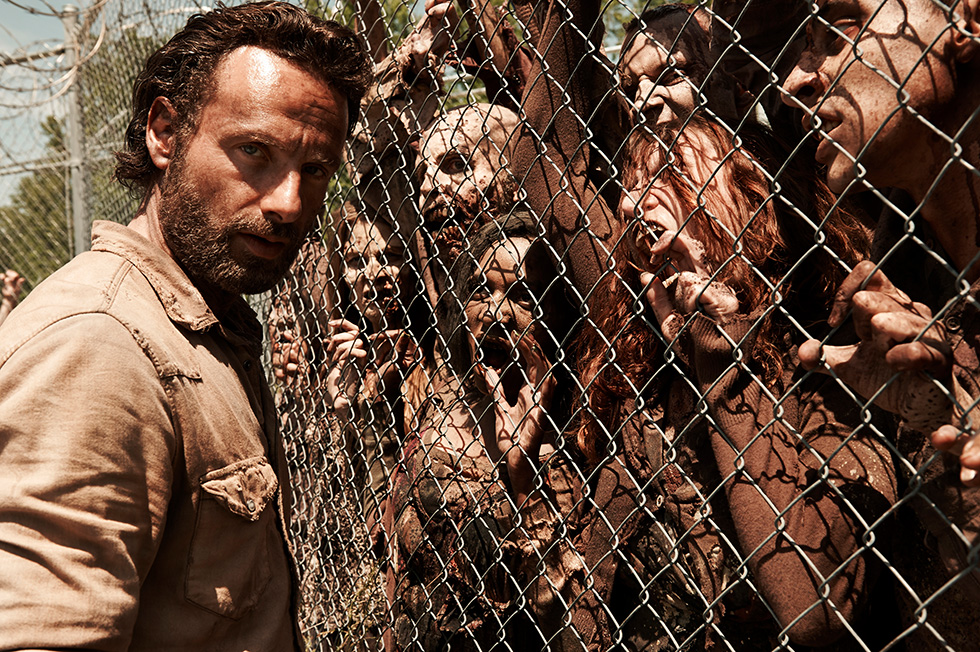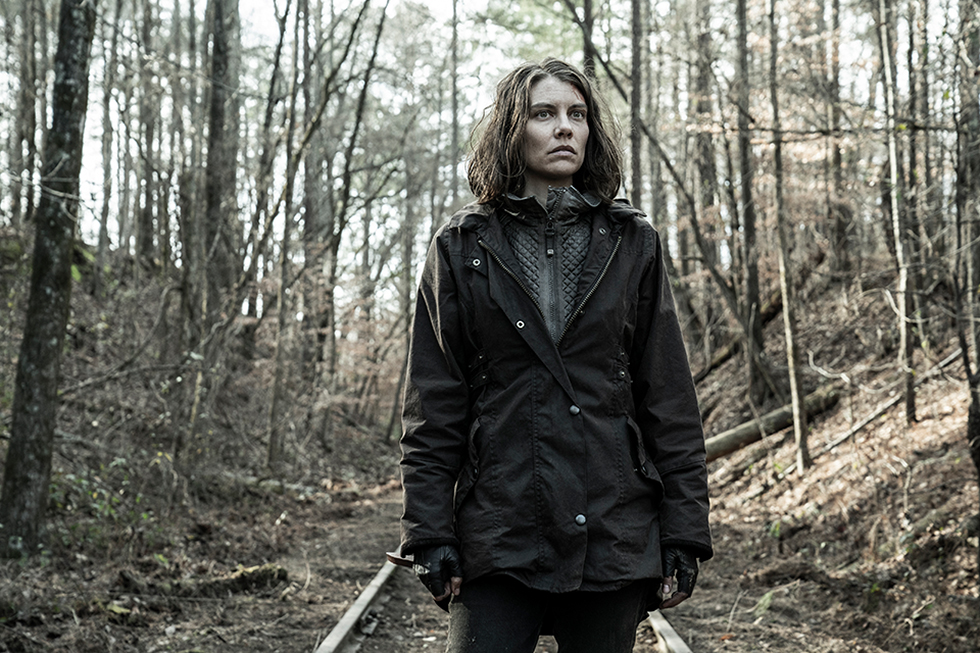B+C Hall of Fame 2023: ‘The Walking Dead’
Iconic Show honoree, AMC/AMC Plus

The smarter way to stay on top of broadcasting and cable industry. Sign up below
You are now subscribed
Your newsletter sign-up was successful
In the beginning of The Walking Dead, Sheriff Rick Grimes — played by Andrew Lincoln — wakes up in an abandoned hospital and finds the world engulfed by a zombie apocalypse.
The series had its debut on Halloween 2010 and AMC Networks awoke to a monster. The premiere drew 6.3 million total viewers and 4.3 million adults 18-49, making it, at the time, the biggest cable series launch ever.
“The show was a ratings success from the first episode, delivering numbers that could only be described as surprisingly good,” former AMC Networks CEO Josh Sapan said. “But even with that initial response, none of us saw the biggest show in the history of cable television coming.”
Read More: Here’s to the 2023 ‘B+C’ Hall of Fame Inductees
During its third season in 2012-13, The Walking Dead became the first cable series in history to rank as the No. 1 series in all of television. It would stay No. 1 in all of TV for five consecutive seasons, with its season five premiere drawing 22 million total viewers and 14.6 million adults 18-49, records that still stand.
AMC had aired a pair of critical darlings in Mad Men and Breaking Bad and wanted to build the network around marquee shows for adults. The network was looking at the horror genre in order to capitalize on its “October FearFest” franchise, Sapan said. “The Walking Dead gave us the momentum to focus on and invest in more great stories,” he said.
There’s Money in the Zombie Apocalypse
The show brought a financial windfall. Revenue at AMC’s domestic networks climbed from $896 million in 2009 to $2.4 billion in 2017, including $959,551 million in advertising.
The smarter way to stay on top of broadcasting and cable industry. Sign up below
The Walking Dead was the first series AMC fully owned. “It was controversial and not even close to universally supported internally — a huge emotional and financial bet,” recalled Roku Media president Charlie Collier, then president and general manager of the AMC network.
“It had been passed on by NBC and others, but we were passionate about the source material,” Collier said. “As we pushed to make the show, [we] discussed what it was about endlessly. It was not about zombies, per se, as much as it was about humanity and survival.”
To Walking Dead comics fan Scott Gimple, who joined the show as a writer and producer in season two, became showrunner in 2013 and then chief content officer for The Walking Dead Universe in 2018, the huge ratings meant “I could plot out three years and not worry about the rug being pulled out from underneath the audience.” Episodes could also focus on a few characters at a time “to make every one of them real people with real lives,” Gimple said.

Because the show was shot in a remote area outside Atlanta, away from other Hollywood productions, it took a while for the show’s magnitude to sink in. “We were on our own, and I think that was a big part of the success of it,” Gimple said. “We held ourselves to very high standards. And we only had so many resources. It blows me away. This was just the right show at the right time with the right people.”
The Walking Dead finished its 11th and final season in 2022, but its characters and its walkers remain undead. Starting in 2015 with Fear The Walking Dead, AMC has expanded the franchise. The Walking Dead: World Beyond and Tales of the Walking Dead have already aired. Upcoming are The Walking Dead: Dead City, The Walking Dead: Daryl Dixon and a series focused on Rick Grimes and Michonne (Danai Gurira).
Dead City stars Lauren Cohan and Jeffrey Dean Morgan reprising their characters Maggie and Negan. Cohan joined the original series in season two. ”I had the benefit of getting the job and then watching season one and saying, ‘Oh my god, this is really good. Don’t screw it up.’ ”
Cohan said it wasn’t until season three or four that she really got the sense of excitement around the show.
Now she’s signed up again. “There was something about the depth of what we could do in The Walking Dead Universe that was always compelling that has kept me coming back for more,” she said. “When you have a character for that long you get to see how they would evolve and be shaped and changed by their environment and their relationships and their losses and their wins.”

In the new show, Maggie is paired with Negan, who killed her lover Glenn in one of The Walking Dead’s most memorable scenes.”This show gives Jeff and I an opportunity to peel off another layer of these characters,” Cohan said. “I don’t think we had that opportunity to do that with a much larger cast.”
In the streaming universe, the show is a hit for Netflix, AMC Plus and a number of AMC FAST (free, ad-supported streaming TV) channels.
From Hit to Franchise
“I can’t overestimate the value of The Walking Dead Universe,” Dan McDermott, president of AMC Entertainment and AMC Studios, said. “It is definitive television history.”
Some of the new Walking Dead series are based on fan favorites characters like Cohan, And if the show sticks to its DNA of “telling human dramas under extreme circumstances,” McDermott said there will be more characters to build on.
McDermott said there’s no limit to how long AMC can tell Walking Dead stories. “We have to take care to ensure that the stories themselves are unique, human and adhere to some of the core principles of what makes this whole universe so unique. We definitely very much believe that every show has to stand on its own and be compelling television. You don’t get a free pass just because the series is a part of an existing universe.”
Sapan compares The Walking Dead franchise to Star Wars and Star Trek. “It is clear by now that these walkers will keep right on walking for many, many years to come,” he said.
Jon has been business editor of Broadcasting+Cable since 2010. He focuses on revenue-generating activities, including advertising and distribution, as well as executive intrigue and merger and acquisition activity. Just about any story is fair game, if a dollar sign can make its way into the article. Before B+C, Jon covered the industry for TVWeek, Cable World, Electronic Media, Advertising Age and The New York Post. A native New Yorker, Jon is hiding in plain sight in the suburbs of Chicago.

